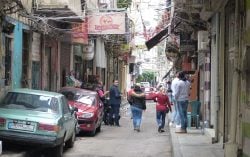Orange Blossoms in Decline
I don’t have a relationship with my green grocer, Nawfal. It’s not my choosing though. He’s constantly preoccupied with his BlackBerry. Nawfal works more at extending his “text-neck” than his relationships with his clients. I could also say I don’t have a relationship with my fresh fruits and vegetables. I happen to pick them attentively, though. And I’ve memorized some of their codes on the electronic scale because Mr. BBM is keeping up with his buzzing phone. But that’s as far as it goes between fruits and vegetables and me. I can never claim I ever paid attention to the price. Nor did I ever stop and think about how these oranges got to Mr. BBM’s point of sale.
I recently was assigned to survey ten farmers in the South. We convened in Tyre at one farmer’s house, which was about to be swallowed by the orchard. Sitting in one room allowed you to get a look into every room of the house. It was one big square that was divided into sections, rather than rooms. The questions revolved around their relationship with wholesalers and what expenses they carry. One farmer broke down in tears several times when the questions about price, transportation and terms of payment came up. These farmers take care of their trees all year, watering them, fertilizing them, picking them, packaging them and transporting them to the market all the while in oblivion as to what price they will be receiving for their produce. Upon arriving to the fruit market, they discover that their box of 20KG is selling for LL7000. That’s LL350/KG. That is on a good day. These same oranges that we end consumers at least pay LL1500/KG for at our local green grocer start off at LL350/KG. The wholesaler who sits around all day makes at least a 100% profit, while the farmer who attends to his trees all year round in thick and snow barely makes a 15% profit. The wholesaler’s minute investment is rent for a location at the fruit and vegetable market while the farmer carries the cost of the land, trees, fertilizer, labor, packaging, transportation and finally the cost of bad weather. Economics for dummies will point out the imbalanced ratio of returns on investment.
For some farmers, the story doesn’t end there. Once a week, I was told, they would send off some 60 boxes to the market, for example. If the market is slow or if there is more produce than demand, the prices drop further. Wholesalers sell the boxes for as little as LL3000 on those days.
“40 boxes were sold for LL120,000,” one farmer recounts.
“There was a LL60,000 transport charge. Every box cost me LL1000 to fill up, so that adds another LL60,000. The wholesaler charges 10% on whatever is sold, so that is LL12,000. When I went to the market the next day hoping to get paid, I was told I owed the wholesaler LL12,000. I had sent out 60 boxes, 20KG each. I sent out 1.2 tons of oranges to the market and ended up owing the wholesaler LL12,000.”
“Everyday there is a different price,” adds another farmer. “The price in the morning is higher than that of the afternoon. The wholesaler decides the price. Every farmer needs a wholesaler to sell his produce. At the beginning of the season, wholesalers charge a 12% flat seasonal fee on whatever they feel the farmer will sell.”
He offers to roll me a cigarette and goes on to explain that if Wholesaler A thinks Farmer A who has a 1000 hectare land will have a $100,000 season, he charges 12% up front, in advance, before the season begins in order to sell the farmer’s produce.
“In addition, the wholesaler charges us 10% on whatever he sells on a daily basis. Whatever is not sold is disposed of.”
Orange season begins in winter and extends through April. During winter and every winter for the past decade, orange farmers brace themselves for a season of agony. The story, sadly, seems to have begun unnoticed a little over a decade ago. In the past, Lebanon’s south had an abundance of orange groves. The scent of orange blossom flowers while driving through the South is imprinted in my mind.
During the 1990’s, Lebanon had an oversupply of oranges. Economics for dummies will tell you that oversupply can be a blessing. It means locals get to eat oranges for cheap and farmers get to export their surplus to nations who cannot grow oranges and are willing to pay more for them. That status keeps the picture in blossom, shall we say.
At the turn of the millennium, Tunisia, Turkey, Greece, Syria and our “neighbor” south of the border upped their production of citrus fruits. These are all nations who strongly support and subsidize their agriculture sector. Their prices outdid ours in the regional market. In addition, at the turn of the century, G. W. Bush’s ingenious foreign policies drove the price of oil up and the value of the dollar down. Lebanon, being a dollarized economy, became more expensive. Many Lebanese orange growers, who were facing an increasing cost of living at home, then also had to compete with their international counterparts who had governments supporting them. Additionally, Lebanon’s ailing government failed to provide any worthy assistance to its agriculture sector. As a result, the majority of Lebanon’s orange growers switched to bananas. The reason for this shift was that south of our border, it was too hot to grow bananas; north of our border, it was too cold to grow them. Again, economics for dummies will tell you here that the Lebanese government needed to stand by its orange growers. While many farmers managed to make the transition to bananas, thereby also asserting our ranking as a banana republic, a big chunk of farmers despairingly stuck to what they know and do best – growing oranges.
Today, farmers are selling fewer oranges for less. But people in Beirut are paying more for their oranges today than they did three years ago. The farmers aren’t any richer. Nor are Beirut’s working and middle classes. However, somewhere along the line, some people are managing to keep up with inflation and have steadily been increasing their income.
“How do you keep going from year to year?” I ask.
“Every year I’ve been selling a plot of land from my inheritance to keep this grove alive,” one farmer, whose house we were in, slowly responds. He looks at the floor and there’s a pause.
Another farmer shouts out, “I’m 77 years old. In any other country, I would be told to sit at home and would be given a monthly retirement check. Instead, I have to wake up every morning and attend to my trees, otherwise my family and I will starve. This is all I know how to do.” I would’ve never guessed he was 77. His tone, smile and vibrancy seem to have stopped in time, back when he was 35.
Farmers need better access to information to cease being at the mercy of wholesalers. Farmers need to get together and become one voice. I asked them, “how come I find out all of this information when I started yesterday and you have the same politicians representing you for twenty years now who either don’t know or don’t want to do anything about your suffering?”
I guess putting up with politicians’ negligence and ignorance is the price to pay if Lebanon aspires to becoming a full-fledged banana republic.





